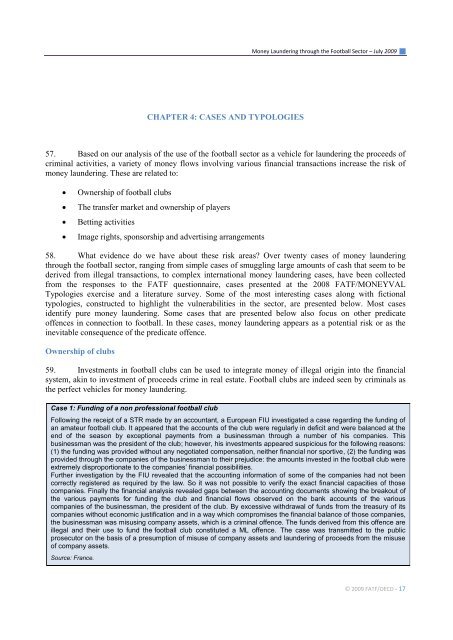Money Laundering through the Football Sector
Money Laundering through the Football Sector
Money Laundering through the Football Sector
You also want an ePaper? Increase the reach of your titles
YUMPU automatically turns print PDFs into web optimized ePapers that Google loves.
CHAPTER 4: CASES AND TYPOLOGIES<br />
<strong>Money</strong> <strong>Laundering</strong> <strong>through</strong> <strong>the</strong> <strong>Football</strong> <strong>Sector</strong> – July 2009 <br />
57. Based on our analysis of <strong>the</strong> use of <strong>the</strong> football sector as a vehicle for laundering <strong>the</strong> proceeds of<br />
criminal activities, a variety of money flows involving various financial transactions increase <strong>the</strong> risk of<br />
money laundering. These are related to:<br />
Ownership of football clubs<br />
The transfer market and ownership of players<br />
Betting activities<br />
Image rights, sponsorship and advertising arrangements<br />
58. What evidence do we have about <strong>the</strong>se risk areas? Over twenty cases of money laundering<br />
<strong>through</strong> <strong>the</strong> football sector, ranging from simple cases of smuggling large amounts of cash that seem to be<br />
derived from illegal transactions, to complex international money laundering cases, have been collected<br />
from <strong>the</strong> responses to <strong>the</strong> FATF questionnaire, cases presented at <strong>the</strong> 2008 FATF/MONEYVAL<br />
Typologies exercise and a literature survey. Some of <strong>the</strong> most interesting cases along with fictional<br />
typologies, constructed to highlight <strong>the</strong> vulnerabilities in <strong>the</strong> sector, are presented below. Most cases<br />
identify pure money laundering. Some cases that are presented below also focus on o<strong>the</strong>r predicate<br />
offences in connection to football. In <strong>the</strong>se cases, money laundering appears as a potential risk or as <strong>the</strong><br />
inevitable consequence of <strong>the</strong> predicate offence.<br />
Ownership of clubs<br />
59. Investments in football clubs can be used to integrate money of illegal origin into <strong>the</strong> financial<br />
system, akin to investment of proceeds crime in real estate. <strong>Football</strong> clubs are indeed seen by criminals as<br />
<strong>the</strong> perfect vehicles for money laundering.<br />
Case 1: Funding of a non professional football club<br />
Following <strong>the</strong> receipt of a STR made by an accountant, a European FIU investigated a case regarding <strong>the</strong> funding of<br />
an amateur football club. It appeared that <strong>the</strong> accounts of <strong>the</strong> club were regularly in deficit and were balanced at <strong>the</strong><br />
end of <strong>the</strong> season by exceptional payments from a businessman <strong>through</strong> a number of his companies. This<br />
businessman was <strong>the</strong> president of <strong>the</strong> club; however, his investments appeared suspicious for <strong>the</strong> following reasons:<br />
(1) <strong>the</strong> funding was provided without any negotiated compensation, nei<strong>the</strong>r financial nor sportive, (2) <strong>the</strong> funding was<br />
provided <strong>through</strong> <strong>the</strong> companies of <strong>the</strong> businessman to <strong>the</strong>ir prejudice: <strong>the</strong> amounts invested in <strong>the</strong> football club were<br />
extremely disproportionate to <strong>the</strong> companies‟ financial possibilities.<br />
Fur<strong>the</strong>r investigation by <strong>the</strong> FIU revealed that <strong>the</strong> accounting information of some of <strong>the</strong> companies had not been<br />
correctly registered as required by <strong>the</strong> law. So it was not possible to verify <strong>the</strong> exact financial capacities of those<br />
companies. Finally <strong>the</strong> financial analysis revealed gaps between <strong>the</strong> accounting documents showing <strong>the</strong> breakout of<br />
<strong>the</strong> various payments for funding <strong>the</strong> club and financial flows observed on <strong>the</strong> bank accounts of <strong>the</strong> various<br />
companies of <strong>the</strong> businessman, <strong>the</strong> president of <strong>the</strong> club. By excessive withdrawal of funds from <strong>the</strong> treasury of its<br />
companies without economic justification and in a way which compromises <strong>the</strong> financial balance of those companies,<br />
<strong>the</strong> businessman was misusing company assets, which is a criminal offence. The funds derived from this offence are<br />
illegal and <strong>the</strong>ir use to fund <strong>the</strong> football club constituted a ML offence. The case was transmitted to <strong>the</strong> public<br />
prosecutor on <strong>the</strong> basis of a presumption of misuse of company assets and laundering of proceeds from <strong>the</strong> misuse<br />
of company assets.<br />
Source: France.<br />
© 2009 FATF/OECD - 17


